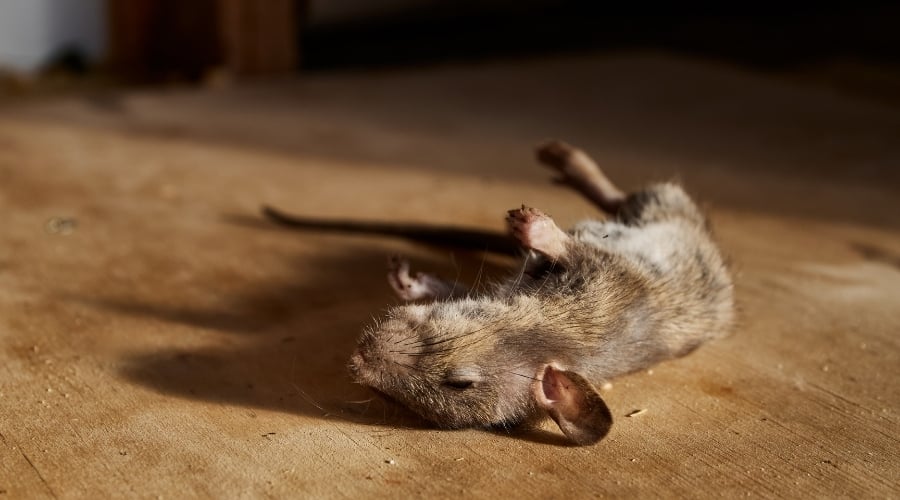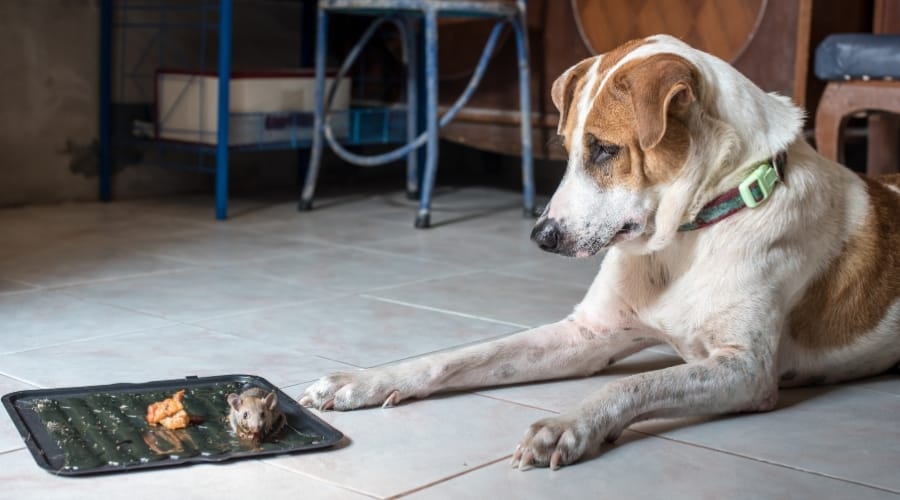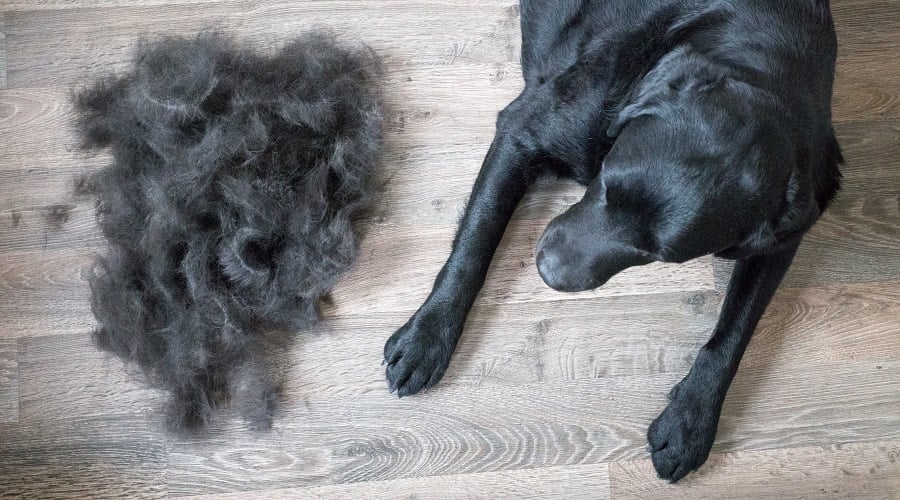My Dog Just Ate A Mouse! What Should I Do Now?
When you purchase through links on our site, we may earn a commission. Here’s how it works.
Did your dog just eat a mouse? Mice are among some of the worst unwanted pests. For centuries, they have been sneaking through small holes or chewing passageways to access areas where food is kept. After depleting the pantry, they are able to quietly escape. They’ll leave behind only a trail of droppings and contaminated footprints.
Table of Contents
Before the mousetrap was invented, dogs were often used as mousers to help protect feed stores and keep living areas clean. The Terrier breed lines were even bred specifically to catch rodent pests; they are small enough to fit through tight spaces and are good diggers to allow pursuit through any terrain.
Even if you don’t have a terrier, it isn’t too surprising to find that your own dog has successfully managed to catch himself a mouse. However, after proudly parading it around for a few minutes, he then decides to gobble it up. What should you do now?
Should I Be Worried?
Dogs eat all kinds of things they aren’t supposed to. When it comes to mouse ingestion, the biggest concern is the possibility that the mouse has consumed poison. This can usually come from a bait trap that is still present in its gut. Oftentimes, the effect of the poison on the mouse will have made it easier for it to be caught in the first place. Mice are born prey animals. They are usually very good at evading animals that are trying to catch them.
A poisoned mouse can seriously harm a dog if it is swallowed. Yes, even if the toxin is only present in small amounts. If your pup has eaten a dead mouse or one caught near a populated area where people are likely to put out rodenticides, call your local pet poisoning hotline or your veterinarian immediately.
A veterinarian may choose to induce vomiting to remove as much of the poisoned mouse as possible. Ideally, this will help get rid of toxins before they are absorbed into the body. Activated charcoal may also be administered afterward to neutralize any lingering poisons in the gut.
Rodenticides Found In Poisoned Mice

There are a few types of common rodenticide poisons which are commonly used in mouse traps. The anti-coagulant type will stop blood from clotting and can cause internal bleeding. Some poisons are a highly concentrated form of Vitamin D which will deplete the calcium stores of the bones and lead to kidney failure. Another type called “Bromethalin” targets the nervous system causing neurologic damage and rapid death.
It can take up to 6 days for a rodent to die from poisoning. This gives sprightly mouse-seeking dogs plenty of chances to capture their prey. If you suspect that your pup has eaten a poisoned mouse, try to pin down the exact type of toxin that was involved.
Let your veterinarian know which rodenticide you suspect when you bring your dog in to see them. With this information on hand, the veterinary team will know which parameters to monitor more closely during their assessment and what emergency treatments to have close to hand.
Will A Wild Mouse Make My Dog Sick?

Unfortunately, there are a number of diseases that are transmitted from mice to dogs. Most of these are parasites that have evolved to live in mice specifically in the hope of being eaten by a dog.
Toxoplasma
Toxoplasma gondii is a microscopic parasite that can live in mice. This can cause an illness called “toxoplasmosis” in dogs, especially dogs that are very young or immunocompromised. Symptoms include fever, diarrhea, and seizures. If your pup has a fever or seizures, bring them to a veterinarian immediately, and inform your vet if your dog has potentially ingested a mouse. Treatment can include antibiotics and other medication to control the symptoms of infection.
Roundworms
Roundworms are a type of parasite that can be picked up in the form of unhatched eggs in the environment by wild mice. Inside the gut of the mouse, the eggs hatch and the larvae make their way into the muscle tissue where they lie in wait. When an infected rodent is eaten, the larvae are also eaten. They can then fully mature in the intestine. Then the parasite will end up feeding off the ingested food to stay alive.
This means that your dog will end up competing for nutrients with a parasite inside its belly. Symptoms of roundworm include weight loss, vomiting, diarrhea, and abdominal pain. A veterinarian can diagnose roundworms by looking at a sample of poo for evidence of roundworm eggs. If your dog does end up with a few of these unwanted guests in the gut, a deworming medication can be used for effective treatment.
Leptospirosis
Leptospirosis is an illness caused by Leptospira bacteria. Dogs can catch leptospirosis from consuming a mouse or from being in contact with a surface that is contaminated with mouse urine. Some dogs will not show any signs of infection but it can manifest with a wide range of clinical signs and lead to death.
The symptoms are so general, including fever, increased thirst, lethargy, loss of appetite, and diarrhea. If you notice a change in you pup’s demeanor with any clinical signs that lasts for more than 24 hours, a veterinarian should get involved.
Leptospirosis is especially damaging in pregnant mothers, as the infection can be passed to their puppies through their shared blood flow. It can also be passed onto humans, especially the elderly or young. If diagnosed, your dog will be given a course of antibiotics from the veterinarian.
Fortunately, there is a leptospirosis vaccine that can significantly reduce the incidence of infection in dogs that are at risk. Have a chat with your veterinarian to see if this vaccine is recommended for your own pup, especially if they like hunting mice.
Can My Dog Catch Rabies From A Mouse?

Mice are very rarely found to be carrying rabies. Some scientists have hypothesized that a rabies infection would kill a mouse too quickly for it to be spread through a bite. Even when it comes to human cases of rabies, an infection has never been tracked to a rodent source.
Will Mouse Bones Harm My Dog’s Gut?
Similar to most birds, mouse bones are very tiny and will most likely be able to pass through without causing any obstructions or perforations. The bones you really have to worry about causing a problem are cooked bones. However, it’s always wise to be alert to the chance of a problem. Usually, blockages happen when your dog consumes something that’s too large for them to pass through their intestines.
Signs of a blockage include vomiting, diarrhea, changes in appetite, or abdominal pain that lasts for longer than 24 hours. If you are concerned, contact your vet and they will be able to advise if any emergency treatment is necessary.
Frequently Asked Questions
Still have a few unanswered questions about dogs and mice? Below are some of the common questions that are asked when a dog eats a mouse unexpectedly.
My dog ate a mouse while we were camping! How can I clean his mouth?
If your dog ate a mouse as a snack while out on a hike or camping, you can be fairly confident that they did not get a side of rodenticide. It is, however, understandable that you probably want to hold off on doggy kisses for a while. Your pup’s mouth is constantly being cleaned with saliva production. Another way that will freshen the mouth is to get your pup to take a drink of water. It will flush away any lingering putrid substances.
You can add a little bit of chicken broth to the water bowl to encourage drinking. Make sure to give the water bowl a good clean afterward, to avoid bacterial growth. If your dog’s mouth is still smelly after taking a drink, you can give him a dental chew or brush his teeth with a dog-safe toothpaste.
Why does my dog keep bringing me dead mice? How can I stop it?
Scientists still aren’t entirely sure why some dogs will present their family members with dead animals. Some theories are that our dog is wanting to show affection with a gift. Your pup may also be trying to teach us how to hunt. You’ll want to dispose of it safely and use disposable gloves for handling, if you can. A dead mouse can be put in your normal household waste but should be wrapped up and placed in a sealed bag. This is to discourage your canine companion or any other animals from fishing it out again.
After dealing with the mouse, wash your hands well and clean any surfaces that the mouse came in contact with. As unpleasant as it is to be finding dead animals on the doorstep, don’t ever punish your dog for this behavior. The best way to discourage it is to calmly place the mouse in the trash without giving any attention.
Should I worry if my dog ate mouse droppings?
If your dog is eating mouse droppings in populated areas, there is still a chance that they will ingest rodenticide residues. In some cases, mouse poison will be able to pass through the mouse’s gut before causing death. As mentioned above, the best thing to do it to contact your veterinarian or local pet poisoning helpline for advice.
Gather as much information as you can including the size of your pup and an estimate of how many dropping nuggets were ingested. The risk of leptospirosis infection is also present if your pup is snacking on mouse poop. Make sure to look out for signs of illness as well.
Final Thoughts
Mice will continue to find their way into the places we live. Unfortunately, both their presence and the actions we take to control them can pose a risk to our dogs. If you are worried about mice in your home, there are a number of dog-friendly mouse control options on the market. Most don’t use rodenticides and hold the dead mouse in a sealed chamber.
Even mice that aren’t poisoned can still pass on diseases to your pup. It’s also a good idea to keep an eye out for wild mice while hiking or camping. Ensuring that your dog has minimal contact with mice will reduce his risk of ingesting dangerous toxins and help you steer clear of any emergency visits to the veterinary clinic.



